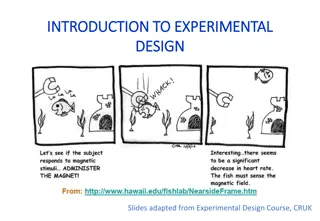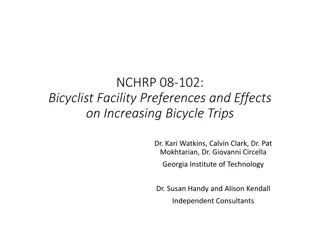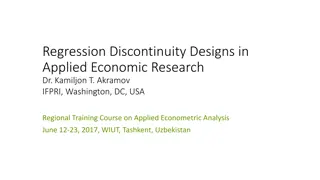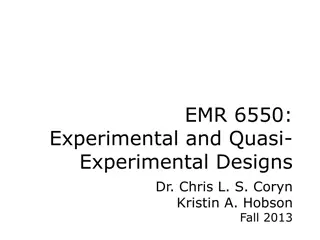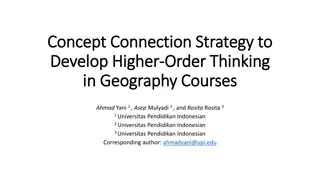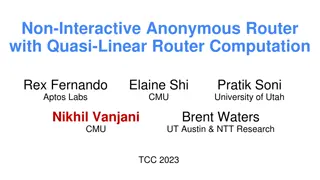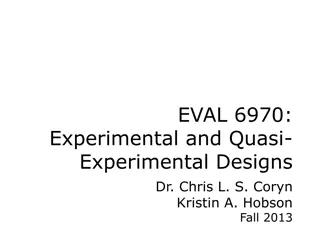Introduction to Experimental Economics by John Hey: A Comprehensive Overview
Explore the interconnected realms of Experimental Economics and Behavioral Economics through the insightful lectures of John Hey, an Emeritus Professor at the University of York. Discover the methodology of testing economic theories for validity and the practical applications of experimental economi
2 views • 58 slides
Insights on Experimental ASF Vaccines in Pig Studies
The research conducted by Prof. Jishu Shi and his team at Kansas State University delves into the safety and efficacy testing of experimental African Swine Fever (ASF) vaccines using pigs as the model. Various vaccines, including DNA vaccines and live attenuated viruses, were tested against differen
4 views • 13 slides
Approaches for Impact Assessment at Centurion University, India
Various approaches for impact assessment include Experimental Design, Quasi-Experimental Design, Before-After Comparison, Counterfactual Analysis, Cost-Benefit Analysis, Qualitative Methods, and Mixed Methods. These methods help evaluate the effectiveness and efficiency of interventions by measuring
0 views • 4 slides
Understanding Experimental Design Principles
Explore the key elements of experimental design, from defining clear objectives to controlling for variation. Learn about the consequences of poor design and the importance of factors like replication and variables. Enhance your understanding of statistical analysis and the principles of a well-desi
0 views • 15 slides
Understanding Quasi-Experiments in Research
Quasi-experiments are research studies that resemble experiments but do not involve random assignment of participants to treatment groups. This approach is taken when random assignment is challenging or when ethical considerations come into play. Unlike true experiments, quasi-experiments can provid
1 views • 15 slides
Understanding Nonexperimental and Quasi-experimental Studies
Nonexperimental and quasi-experimental studies resemble experiments but lack random assignment, making them valuable for group comparisons without establishing causation. This type of research design looks at differences between groups that already exist, focusing on group differences rather than ca
1 views • 35 slides
Design of Experiment in Animal Genetics & Breeding: Principles and Methods
Biostatistics and computer applications play a key role in the design of experiments in animal genetics and breeding. Proper allotment of treatments to experimental units is crucial to study treatment effects accurately. Designing experiments helps in maximizing information from available resources,
0 views • 37 slides
Understanding Multiple Baseline Designs in Behavioral Experiments
Multiple Baseline Designs are a type of experimental design used in behavioral research. This design involves measuring two or more behaviors concurrently in a baseline condition, applying a treatment variable to one behavior at a time while maintaining baseline conditions for others, and then seque
0 views • 34 slides
Understanding Experiments in Research: Observation vs. Experimentation
Observation and experiments are two crucial methods in research. An observational study involves observing and measuring variables without influencing responses, while an experiment deliberately applies treatments to measure responses. Confounding variables can affect the results, and factors like e
0 views • 13 slides
Understanding Experimental Psychology: Designs and Control Issues in Research
This content delves into the basics of experimental research, focusing on different types of experimental designs and control issues. It covers between-group and within-group designs, discussing advantages and disadvantages, as well as methods for controlling for nonequivalence. The importance of ra
0 views • 26 slides
Quasi-Judicial Roles and Ethical Responsibilities in Decision-Making
Exploring the distinction between legislative and quasi-judicial roles in decision-making processes, this content delves into examples, principles, and ethical responsibilities. It emphasizes fairness, impartiality, and the importance of public trust in upholding ethical standards within quasi-judic
0 views • 34 slides
Understanding ANOVA in Experimental Design
In this educational content, we delve into the key concepts of ANOVA (Analysis of Variance) in experimental design. Topics covered include the necessary assumptions for conducting one-way ANOVA, the importance of testing factors in two-way ANOVA, various types of sum of squares, comparisons between
2 views • 15 slides
Software Engineering Design Principles and Concepts
The chapter discusses the essential principles and concepts in software design, highlighting the four key design models - data design, architectural design, interface design, and component-level design. It emphasizes the importance of traceability to the analysis model, minimizing the gap between so
1 views • 36 slides
Understanding Correlation in Research Designs
Research designs like experimental, quasi-experimental, and correlational serve different purposes in studying variable relationships. Correlation does not imply causation and can be positive or negative, indicating how two variables change together. The correlation coefficient quantifies this relat
5 views • 43 slides
Understanding Probability: Experimental and Theoretical Concepts
Probability is the measure of the likelihood of an event happening, with experimental and theoretical probability being key concepts. Experimental probability involves determining probabilities through experience or experiments, while theoretical probability can be calculated without prior experienc
2 views • 23 slides
Meta-Evaluation of Private Sector Interventions in Agribusiness: Impacts and Methodologies
This meta-evaluation study explores the impact of access to finance and farmer/business training interventions on agribusiness indicators. It discusses the methodologies used in evaluations, highlighting the use of randomized control trials and quasi-experimental methods. Findings provide insights i
0 views • 25 slides
The Effect of Rondo Training Method on Football Passing Skills Study
Accurate passing in football is crucial, especially under pressure. Rondo training method, involving passing between players in limited spaces, can enhance passing abilities. This study evaluates the impact of Rondo training on football passing skills using a quasi-experimental design with pretest a
0 views • 8 slides
Recent Applications of Quasi-Poly Time Hardness in Densest k-Subgraph
Recent applications of the Birthday Repetition technique have demonstrated the quasi-polynomial time hardness in various computational problems, including AM with k provers, Dense CSPs, Free games, and Nash equilibria. These applications also explore the potential implications in signaling theory an
0 views • 18 slides
Impact of Shadow Boxing and Pad Work Training on Self-Confidence of Muay Thai Participants
Muay Thai participants at Revolt Gym engage in shadow boxing and pad work training to enhance their skills and build self-confidence. Self-confidence in sports is crucial for success, and these training methods play a significant role in developing mental and physical capacities. The study investiga
3 views • 8 slides
AP Statistics Homework Agenda and Experimental Design Example
In this AP Statistics homework agenda, students work on warm-up questions, checkups, and a controlled experiment design example involving paper airplanes and natural light impact on test scores. The agenda covers various topics such as confounding variables, random vs. blocking, and controlled exper
0 views • 15 slides
CO2-Laser-Driven Dielectric Laser Accelerator Proposal
Study and experimental demonstration of a CO2-laser-driven dielectric laser accelerator, addressing the limitations of current accelerator technologies by utilizing longer laser wavelengths for increased charge and improved beam control. The proposal aims to develop a novel in-vacuo scheme for ultra
0 views • 13 slides
Quiz Review on Scientific Method and Graphing
Explore a quiz review covering topics related to scientific method, graphing, and experimental design. Understand key concepts such as hypothesis, scientific law, theory, variables, and experimental control through detailed questions and images. Test your knowledge on laboratory safety, inferences,
0 views • 14 slides
Understanding Balanced Incomplete Block Design in Experimental Statistics
Balanced Incomplete Block Design (BIBD) is a crucial experimental design method where treatments exceed units per block. This approach helps efficiently analyze data by organizing treatments into blocks and replicates. In the provided example, Ford Falcon prices quoted by dealers to interviewers sho
0 views • 20 slides
Understanding Bicyclist Facility Preferences for Increasing Bicycle Trips
This research study aims to investigate the various preferences and effects of different bicycle facilities on increasing bicycle trips. It explores how individual preferences for bike facilities differ and the effectiveness of these facilities in attracting new trips. The study delves into the impa
0 views • 52 slides
Understanding Regression Discontinuity Designs in Applied Economic Research
Regression Discontinuity Designs (RDD) allow for estimating causal treatment effects in non-experimental settings by exploiting precise rules determining treatment. This design provides good internal validity but limited external validity. RDD is well-suited for analyzing quasi experiments near know
0 views • 43 slides
Understanding Quantitative Research Designs in Nursing
Delve into the world of quantitative research in nursing, exploring different research designs and the concept of causality. Learn about experimental, quasi-experimental, and non-experimental designs, as well as the characteristics of experimental design like manipulation, control, and randomization
0 views • 22 slides
Advancing Counterterrorism Strategies: Research Updates and Evaluation Methods
Recent research and developments in countering terrorist narratives highlight efforts spanning from pre-radicalization to disengagement phases, emphasizing interventions to challenge extremist ideologies and promote critical thinking. Evaluation tools and recommendations, including the use of quasi-
0 views • 8 slides
Quasi-Experimental and Interrupted Time-Series Designs Overview
Explore the various quasi-experimental designs, control groups, pretests, and outcome patterns in research methodologies. Understand the implications of different outcome patterns on causal interpretation and validity threats in experimental studies.
0 views • 31 slides
Enhancing Higher-Order Thinking in Geography Courses through Concept Connection Strategy
Development of a learning model focused on Higher Order Thinking Skills (HOTS) is crucial in the 21st century. This study explores the potential of utilizing the concept connection strategy to enhance students' HOTS in geography classes. A quasi-experimental design was employed with high school stud
0 views • 9 slides
Labor Market Reforms and Unemployment: A Detailed Analysis
Labor market reforms and their impact on unemployment rates are examined through a Difference-in-Differences analysis in this study led by Armingeon and Baccaro in June 2013. The research questions whether liberalizing reforms actually reduce unemployment and increase employment levels. The findings
0 views • 13 slides
Understanding Experimental Design in Biology
Explore key concepts in experimental design in biology through clicker questions focusing on hypotheses, variables, control groups, and experimental groups. Learn how scientists test hypotheses and analyze results to draw valid conclusions in biological studies.
0 views • 15 slides
Compilation and Evaluation of Experimental Data for Nuclei in Z=2-28 Region
Completed compilation and evaluation of experimental Pn and half-lives for nuclei in the Z=2-28 region, led by Balraj Singh at McMaster University. The work involved preparing lists of neutron-rich nuclides, identifying potential emitters, analyzing available experimental data for 1n, 2n, 3n, and 4n
0 views • 20 slides
Biostatistics Core Principles in Experimental Design for Research Studies
Gain insights into the core principles of biostatistics for research studies, including experimental design, sample size considerations, and involving a biostatistician. Learn to formulate clear research questions, determine treatment groups, and address potential sources of variability in your stud
0 views • 52 slides
Understanding the Importance of Public Hearings in Planning and Zoning
Public hearings play a vital role in the planning and zoning process, covering legislative and quasi-judicial matters. Legislative hearings focus on law changes, while quasi-judicial hearings deal with specific site matters. Best practices include laying the groundwork, following orderly procedures,
0 views • 13 slides
Non-Interactive Anonymous Router with Quasi-Linear Computation
Explore the concept of a Non-Interactive Anonymous Router with Quasi-Linear Computation, Receiver Insider Protection (RIP), Sender Insider Protection (SIP), and Multi-Client Functional Encryption. The comparison of anonymity notions in NIAR and the motivation behind the non-interactive anonymous shu
0 views • 29 slides
Understanding Experimental and Quasi-Experimental Designs
Explore the foundations of experimental and quasi-experimental designs, delving into causal relationships, counterfactual reasoning, and the importance of validating statistical and internal conclusions. Learn about causes, effects, and the complexity of determining causation in research. Discover R
0 views • 46 slides
Quasi-Interpolation for Scattered Data in High Dimensions: Methods and Applications
This research explores the use of quasi-interpolation techniques to approximate functions from scattered data points in high dimensions. It discusses the interpretation of Moving Least Squares (MLS) for direct pointwise approximation of differential operators, handling singularities, and improving a
0 views • 9 slides
Understanding Experimental Studies in Epidemiology
Epidemiological studies and experimental studies play vital roles in understanding cause-and-effect relationships in research. Experimental studies involve manipulating independent variables and measuring dependent variables, with categories such as true experimental, quasi-experimental, and pre-exp
0 views • 22 slides
FY25 LBS Lab OMEGA/OMEGA EP Proposed Campaign
Proposed campaign in FY25 by the LBS Lab to measure specific deliverables, compare results with experimental and theory PIs, collaborate with others, and assess technical issues such as target fabrication feasibility. The campaign involves motivation, relevant milestones, previous/simulated results,
0 views • 6 slides
Understanding the Federal Features of the Indian Constitution
The Indian Constitution exhibits a unique blend of federal and unitary characteristics, termed as quasi-federal. This constitutional setup grants power to both the center and states, yet allows for central intervention in certain circumstances. The Parliament holds authority over creating new states
0 views • 4 slides



